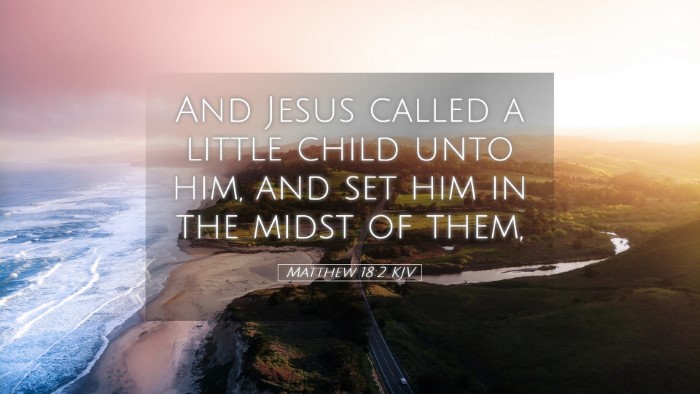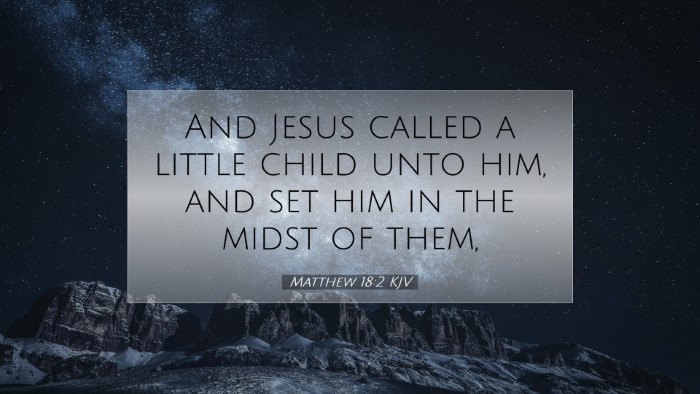Commentary on Matthew 18:2
Verse: "And Jesus called a little child unto him, and set him in the midst of them."
Introduction
This particular verse from the Gospel of Matthew presents a profound moment in Jesus’ ministry. It is a teaching moment that carries deep implications for understanding humility, faith, and the nature of the Kingdom of Heaven. The context of this episode is crucial, as it reveals the disciples’ preoccupations with greatness and status in the Kingdom.
Contextual Background
The question that initiated this teaching was posed by the disciples themselves as they asked, “Who is the greatest in the kingdom of heaven?” This reflects much about human nature, our tendency to seek status and recognition. In response, Jesus’ actions of calling a child and placing him among them serve as a counter-narrative to their ambition.
Insights from Matthew Henry
Matthew Henry emphasizes that by calling the child, Jesus illustrates the nature of humility required to enter the Kingdom of Heaven. He observes that children are often humble, dependent, and trusting, qualities that are prerequisites for any believer.
- Humility: Children do not boast about their accomplishments; rather, they receive what is given to them.
- Dependence: Children inherently depend on adults for their needs, symbolizing the believer's dependence on God.
- Trust: A child’s simplicity of faith is a model for how believers should approach their relationship with God.
Analysis from Albert Barnes
Albert Barnes adds layers to the understanding of this passage by suggesting that the act of Jesus is a semiotic portrayal of the new order in the Kingdom. He notes that Jesus places a child where the disciples were supposed to be. This indicates that greatness in the Kingdom is not found through accolades but through the grace and qualities exemplified in the child.
- Sign of the Kingdom: The child represents the ideal citizen of the Kingdom.
- Lessons on Greatness: Barnes interprets Jesus’ action as a lesson that the disciples must learn that to be great in the Kingdom, they must become like children.
Reflection by Adam Clarke
Adam Clarke provides a more theological reflection on this verse, highlighting the implications for understanding the nature of faith and the divine order. He suggests that Jesus’ emphasis on the child not only teaches about humility but also about the innate characteristics of faith that are often lost in adulthood.
- Faith of a Child: Clarke indicates that the child’s faith is pure and unadulterated, unfettered by the complexities of the world.
- Divine Acceptance: Jesus’ act signifies that children hold a special place in the eyes of God, reinforcing the idea that the Kingdom is inclusive and welcoming.
Theological Implications
The implications of this verse extend far beyond its narrative context. It challenges the reader to contemplate how society measures worth and greatness. In God’s economy, reliance on oneself, pride, and worldly recognition are subverted by humility, faith, and dependence on His grace.
Applications for Pastors and Leaders
For pastors and church leaders, this passage calls for reflection on how ministry is conducted and the priorities that are set within congregations.
- Encouraging Humility: Pastoral leadership should model humility and not self-promotion.
- Creating a Welcoming Community: Churches should foster environments that welcome the least and the vulnerable.
- Emphasizing Faith over Works: Ministry should remind congregants that faith in Christ, not works, is the cornerstone of salvation.
Reflection for Theologians and Scholars
For theologians, this passage is rich in examining Christology and the nature of God’s Kingdom. The profound nature of Jesus’ teachings often challenges conventional wisdom on power and spirituality.
- Understanding the Kingdom: How does this teaching reshape our understanding of Kingdom dynamics?
- Christ’s Method: Analysis of Jesus’ pedagogical techniques can yield insights into effective teaching methods in ministry today.
Conclusion
Matthew 18:2 is a powerful verse that invites a re-examination of values within the Kingdom of Heaven. By using a child as a teaching tool, Jesus shifts the paradigm of greatness, emphasizing qualities of humility, dependence, and genuine faith. The insights derived from public domain commentaries serve to enrich the theological understanding of this passage, providing practical applications for present-day faith communities.


